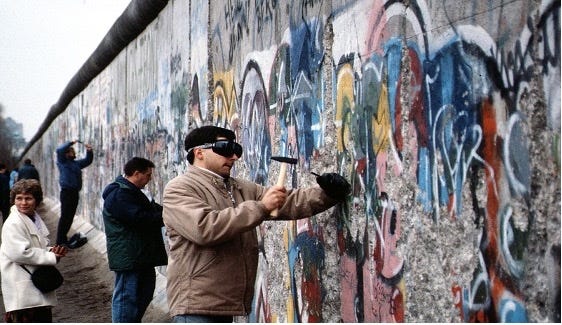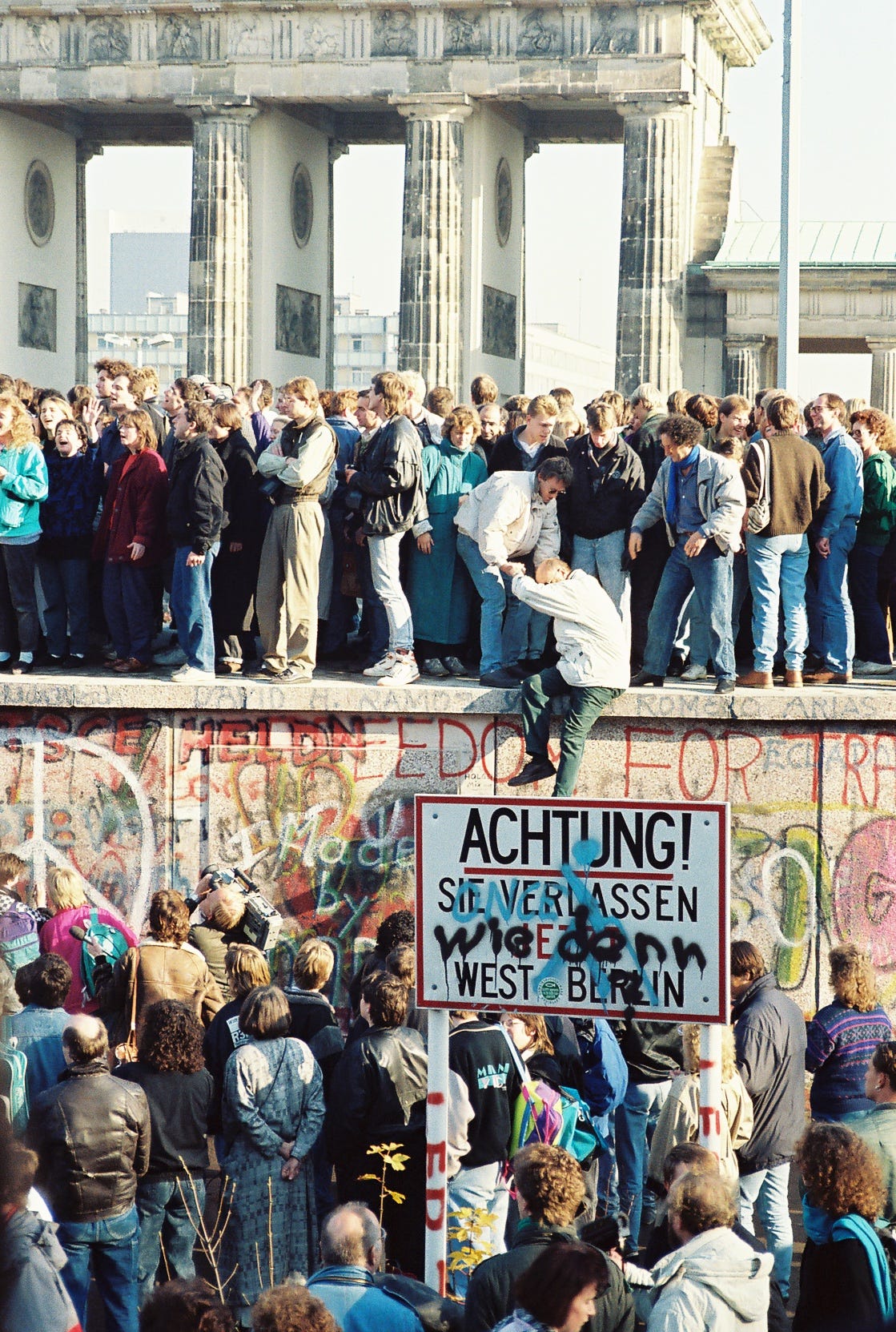I was not in Café Adler on November 9, 1989, when the Wall came down. I was in a small hotel a few blocks away, fast asleep. What woke me in the small hours was the curious, repeated, chink-chink, floating through the dark. But I turned over and went back to sleep. Only the next morning did I discover that I’d missed one of the best parties of the century at Café Adler. The fluting notes I’d heard in the night turned out to come not from birds, but from determined saboteurs, known as ‘wall-peckers’. Armed with chisels, files, and hammers, they had spent the night breaking open, in the unbreachable Berlin Wall, spaces large enough to allow people to cross from East into West Berlin.
‘Wall-Peckers’ at work. Raphaël Thiémard Berlin 11 09 89
Many years later, the Daily Mail published Johnathan Mayo’s superb report, knitting together the events that began on the night of November 9, 1989, in and around that little quarter where Café Adler was king. As the Wall was coming down, a waitress at Café Adler offered glasses of champagne to the East German border guards. They were far too nervous to accept. The first East Berliners, pushing their delighted way through the gaps in the Wall, had no such qualms. Like the guy who rushed into the café shouting: ‘I’m the first! I’m the first!’ All the customers applauded him when he asked the waitress to ink his hand with the stamp she used on the bills. The early East Berliner left proudly, with a stamp on the back of his hand that read: ‘Café Adler Friedrichstrasse 206 1000 Berlin 61 Tel: 030/2518965’.
Suddenly there were so many exhilarated East Germans arriving at the Café Adler that the solitary waitress phoned the owner, Albrecht Rau, with an urgent message. ‘You have to get here because I’m totally alone and thousands of people may be coming at any moment! This is the first place they’ll reach!’
She was right.
I was at Checkpoint Charlie the next morning. The images I have of that bewildering day are as sharp as ever. East German border guards helping through the wall, elderly pensioners, whom a few days earlier they might have shot. Crowds at the cash dispensers on the Western side, drawing the 100 Deutsch Marks, to which each newly-arrived East Berliner was entitled. Little Trabants, the peoples’ car in East Berlin, crossing at Check Point Charlie, pushing hesitant noses, like mechanical mice into the ferocious West Berlin traffic.
A young family, mother, father and child in a push-chair, pausing outside the windows of the posh KAWEDE department store, near the Kurfürstendamm. Its windows were flowing with chocolates, rivers of them glittering gold and silver wrappers, dazzling under the spotlights, far too many ever to afford or eat. The mesmerised trio stared for a long time and then, with a shake of their heads, like people waking from a trance, went on their way.
Berliners on the Wall near the Brandenburg Gate, November 1989
Nothing, it seemed, was beneath rapt contemplation. A man slowly hosing down his Mercedes drew a respectful crowd. The sign pointing towards a sex shop called ‘Big SexyLand’ was observed in silence. Could there be such an establishment and, if so, how did it come to be located in a street named after Martin Luther?
An American magazine in Washington tracked me down in Berlin on November 9 and asked for a story. I wrote it that day, as much to convince myself that what I was seeing when the Wall came down, as to convey to disbelieving Americans, the inexplicable strangeness of it all. I called the piece: ’Exit the Trabant, pursued by a Porsche…’ It was just a stab at capturing the unknown. No-one knew what was happening in Berlin in those days and anyone who suggests otherwise is lying. What I do know is that by the early hours of that morning, so many East Berliners had squeezed through the holes in the Wall and turned up for a drink in Café Adler that the truly unthinkable happened and the beer ran out.
Some cafés achieve greatness only after they are not there anymore. I went back some years later to the Adler at the invitation of a Berlin paper. I wrote a piece about a man with two heads, each looking in the opposite direction. Because the Fall of the Wall changed everything but explained nothing. Today in Germany, the East is still a confused and haunted terrain and the very recent elections reveal that yearnings for the strong-armed ideologies of the old East still live on. Renamed and relaunched, but as fierce as ever. Maybe revolutions do not always devour their children; sometimes they drive them crazy instead.
What made Café Adler rare and valuable, was its perfect location beside the Wall, looking West and East. A warm, well-lighted refuge in the midst of a very Cold War. Café Adler closed in 2008. Its owner claimed it had been hemmed in by ceaseless redevelopment. That new development has been vacuous and unfortunate, a blizzard of interminable blandness only a developer might admire has obliterated the old neighbourhood. Another café has replaced the Adler and Checkpoint Charlie is reduced to a poster of a grinning American soldier.
Café Einstein, or what was once Cafe Adler and Checkpoint Charlie
Quite what the fall of the Berlin Wall means, almost four decades after it came down, is a mystery. But if this is the way you win a Cold War then perhaps we should all try hard not to have another. It was Zhou Enlai, the wily prime minister under Mao Tse Dung, who got closest to the best answer when he was asked what he made of the French Revolution. ‘It is too soon to say,’ he said.
Christopher Hope







